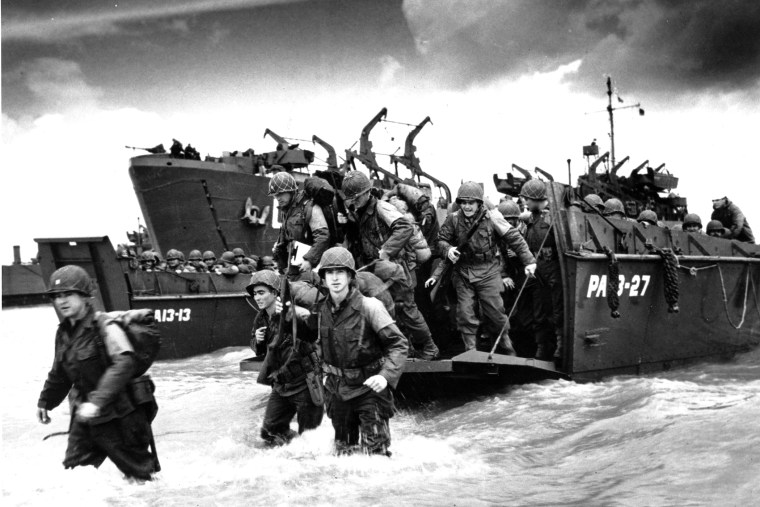On the 75th anniversary of the D-Day invasion, we are running some of the columns Mike Barnicle wrote for the Boston Globe commemorating the 50th anniversary.
--
Buddies once, buddies forever
The Boston Globe
June 2, 1994
By Mike Barnicle
COLLEVILLE-SUR-MER, France -- At dusk last night, the old sergeant cried. His name was Ed Fleming and he is 70 and he stood with his wife, Louise, on one small piece of the 172-acre burial ground called the American Cemetery and remembered that morning 50 years ago when he and a friend, Louis Noury of Lawrence, were merely two young soldiers among thousands who spilled onto Omaha Beach in order to kick the door down and free France.
"I remember Louis very well," Fleming said as he knelt on the lush lawn by Noury's grave. "I remember his face. I remember his laugh. I remember him."
"Are you OK, honey?" Louise Fleming wanted to know.
"Fine," her husband told her. "I'm fine."
Noury and Fleming were both with the 29th Division of the United States Army. Fleming had come from Worcester and the two men met in England, where the world's largest invasion force was being assembled to sail across the Channel and push the German army off territory it had occupied for four years.
Today, Fleming lives in Florida with his wife, whom he met in 1945 when she was a Red Cross nurse in Paris. Louis Noury was killed here and he is now one of 9,386 Americans buried on a beautiful bluff above beaches that were colored red with blood on that long ago day when history was made.
For several days, veterans from several countries -- American, Great Britain, Canada and France -- have been arriving in Normandy for their last great reunion. Narrow country roads that look nearly the same as they did in the summer of 1944 are clogged with tour buses and private cars, all bringing soldiers home to sacred ground.
Yesterday, as preparations continued for Monday's visit of President Clinton, army helicopters swooped low over the beach, practicing landings and takeoffs as three jets shot though a low overcast sky above staging being built at the edge of the cemetery for the cast of the Today show. As construction went on, an army captain named Chambers led a platoon of young soldiers flown here from Germany to assist with traffic and security in run-through of Clinton's duties.
The Flemings watched as Capt. Chambers stood at the edge of an outdoor amphitheater where two platforms filled with eight long rows of orange plastic chairs had been assembled on opposite sides of a narrow mall by the twin entry portals to the cemetery. This is where Monday's important guests will be seated and the captain said: "OK, ladies and gentlemen, listen up. This is where the first lady will withdraw from the president and the president will then proceed alone to the podium."
Just to the right of where the soldiers stood, there is a large wall mural, color-coded with directional arrows and unit insignias, that depicts the movement of hundreds of thousands of troopers who hit beaches called Omaha, Utah, Gold, Juno and Sword.
"Thing I remember the most is the terrible noise," Ed Fleming was saying. "The noise of the guns being fired on the ships behind us and the guns the Germans were picking us off with right here. It was horrendous. That, plus being scared out of my mind."
As he spoke, several other couples wandered over to watch the flags being lowered at the conclusion of another emotional day. They were all in their late sixties or early seventies. They were gray with age and some of the men walked with a limp while others had eyes that betrayed all the damage of the lost years as they surveyed acre after acre of white stone crosses and Stars of David that resemble an endless picket fence that reaches out to the calm water on the horizon.
"Hello soldier," one of the men said to Ed Fleming. "Who were you with?"
"Bravo Company of the 29th," Fleming told him. "What about you?"
"Second Ranger Battalion," the man replied.
"Pointe DuHoc," Fleming said, the words a statement that hung in the mellow air.
"Leo Thompson," the old ranger said, extending his hand.
"Ed Fleming," he said, the two men shaking hands.
"This is something, isn't it?" Thompson said.
"It's unbelievable," Ed Fleming responded.
"How many did you boys lose?" Thompson wanted to know.
"About half," Fleming reported.
"Man," said Thompson. "We're lucky to be alive."
"You men are heroes," Louise Fleming said to the two of them. "I never realized what heroes you were until today when I saw all this. Nothing in the world prepares you for a sight like this. And you were here when you were just boys. I'm so proud of all of you."
Now, the younger soldiers of today were off in the distance surrounded by a brilliant dusk, folding the colors as a canon boomed and a trumpet played, its last dull note washing across the white stones and green lawn, disappearing in the enveloping darkness. The old veterans and their wives watched the ceremony and then headed slowly to the parking lot for the drive back to the town of Caen. More than a couple of them limped and some, just like Ed Fleming, cried tears for friends who are here forever.
